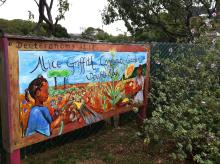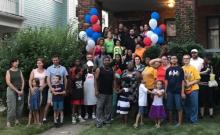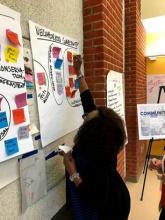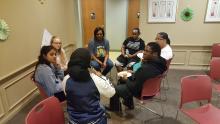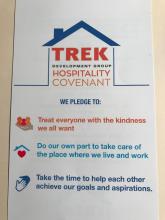Research
U.S. cities and towns are increasingly pursuing Inclusionary Housing Programs (IHPs) as a way to expand affordable housing and have vibrant, diverse, and inclusive communities. NIMC had the opportunity to partner with the City of Cambridge, Massachusetts, an early IHP adopter (and one of the nation’s largest programs with more than 1,200 affordable rental and homeowner IHP units) on a two-year research project exploring residents’ perceptions of their community’s social climate. The study sought to answer three main questions; (1) In what ways do residents’ experience their community to be welcoming and inclusive? (2) To what extent do residents’ experience bias, stigma, and exclusion? and (3) How do residents’ experiences differ based on their various social identities, including their gender, race, ethnicity, age as well as being a household with children and/or living in a IHP designated unit. Read about the study and our findings in the final report.
Jobs Plus is an evidence-based, federal public housing program that aims to support public housing residents in their pursuit of employment opportunities. Jobs Plus includes three key components: employment-related services, Community Support for Work, and financial incentives. Since 2015, HUD has awarded grants to 24 public housing agencies for a total of $63 million in funding. NIMC, in partnership with MDRC and the Center for Urban and Regional Studies at the University of North Carolina just completed a process study of nine cities that have implemented Jobs Plus. The interim report for the study can be found here.
HOPE SF is an innovative initiative that is working to transform four of San Francisco’s most isolated public housing developments into thriving communities of opportunity. The public-private initiative is the first citywide public housing revitalization project to establish principles to guide redevelopment, including seeking to maximize the rate of return for public housing residents. NIMC has been engaged in the evaluation of the initiative and is working with our consultation partner Trusted Space Partners and local developer Mercy Housing on strategies to develop inclusive mixed-income communities.
Effective Neighboring Project seeks to learn how to promote and sustain “effective neighboring”, promoting and sustaining meaningful and supportive interactions among neighbors of different races, incomes, and backgrounds by exploring existing cases of neighbors bridging across differences in a meaningful way on two streets in Cleveland, Ohio. The two streets (East 128th Street in the Larchmere-Buckeye neighborhood and Soika Avenue in the Mt. Pleasant neighborhood) accepted NIMC’s invitation to collaborate and agreed to have their functional neighboring behaviors tested for improvements across diversity through an intervention based design over the course of a year. Progress was achieved through deep engagement in partnership with the target communities to develop the best strategy for studying the communities’ effective neighboring behaviors. NIMC used a participatory action research methodology with resident liaisons to conduct a baseline survey, to design neighboring interventions, and to implement effective neighboring interventions on the blocks, which will be measured by a post-test survey.
The Mixed-Income Strategic Alliance launched in 2017 in partnership with the Center for the Study of Social Policy and Urban Strategies, Inc. The Mixed-Income Strategic Alliance is led by Founding Director Salin Geevarghese who has successfully helped secure support from the Ford Foundation, Robert Wood Johnson Foundation and the Kresge Foundation. The Alliance created the Mixed-Income Innovation and Action Network, the nation’s only peer-affinity network focused exclusively on mixed-income community building. The Network has been selectively and incrementally formed to establish a high bar for operational quality and experience, to build deep and trusting collaboration and exchange, and to ensure a high degree of organizational commitment and engagement. Through this Network, the Alliance will be able to influence the trajectory of mixed-income efforts across the nation and leverage millions of dollars in public and private sector funding that has already been committed to mixed-income place-based revitalization. The first four co-design Network members are Memphis , Minneapolis, Seattle, and King County, WA, represented by the leaders in these places from local philanthropy, City and housing authorities.
Consultation
Choice Neighborhoods Initiative is a federal program that leverages public and private funding to redevelop distressed public or HUD-assisted properties into mixed-income housing, to improve outcomes for households living in the target housing, and to create thriving neighborhoods. NIMC is supporting a planning grant for Woodhill Homes in Cleveland, Ohio by working with partners on the needs assessment and people-focused portions of the Transformation Plan that may lead to an implementation grant to redevelop Woodhill Homes. NIMC has supported previous applications for implementation grants for Cedar Estates in Cleveland, Ohio. NIMC was also on the Urban Institute’s evaluation team of the first five implementation grants. The report from that evaluation is available here.
New Communities Initiative (NCI) is a DC government program designed to revitalize severely distressed subsidized housing and redevelop neighborhoods into vibrant mixed-income communities. Since early 2017, Triple Aim Impact (NIMC joint venture) has been engaged with the initiative. Triple Aim Impact and Ghost Note Agency responded to a call to action from NCI to help residents achieve 100% resident success through the design and implementation of community network building strategies. In order to increase the quality of life for those who work and live in the NCI neighborhoods, we had two short term goals: to spark new relationships of mutual support across lines of difference and to spark action within the network. Our long term goal is to help create an underlying operating culture within the new mixed-income community that is aspirational and connected. In order to ground our strategies in the community, we engaged in heavy outreach efforts throughout the summer and fall, with dozens of door-knocking sessions and “pop up parties.” We now have regular “NeighborUp Nights” – 90-minute gatherings where community members connect with one another, host small group conversations, and exchange small gifts and favors. These NeighborUp Nights tell the story of the growing size and strength of the neighborhood networks – with naturally increasing attendance and leadership among residents in facilitation and planning. The emerging networks have also led to action in support of neighborhood issues, such as pedestrian safety, as well as the formation of individual relationships.
Commodore Place Apartments, a 198-unit apartment building in Cleveland, Ohio located in a retail district near the Case Western Reserve University campus is currently undergoing mixed-income revitalization, led by owners The Community Builders, Inc. (TCB). Since 2016, NIMC has been developing and implementing a strategy for community building and resident empowerment in conjunction with social work students from the Mandel School of Applied Social Sciences. In October 2017, The Community Builders, Inc. (TCB) and NIMC secured a planning grant from the Cleveland Foundation to improve the quality of life of residents by empowering them to access services and programs in the broader community, and to build and develop a solid sense of community in the Commodore. One of the most successful strategies for building community in the Commodore is the planning and implementation of “NeighborUp Nights”, based on the model developed by Neighborhood Connections and used by Triple Aim Impact, which has proven to be an effective platform for resident engagement and leadership. NIMC and TCB continue to work with partners at Case Western Reserve University, University Circle, Inc. and University Circle Police Department to support residents and activities that connect residents to the surrounding community.
Cleveland Neighborhood Progress has engaged NIMC and the Community Innovation Network (CIN) to develop racial equity and inclusion metrics and to track progress on racial equity and inclusion interventions implemented by Cleveland Neighborhood Progress partners across Cleveland’s community development industry.
Trek Development was the first for-profit developer to contract for technical assistance from our Triple Aim Impact partnership with Trusted Space Partners in 2015. Our strategic consultation with the company’s executives and senior team has generated an operating culture shift within the company that incorporates a more aspirational aim for their mixed-income developments and involves greater integration across the development, property management and resident services departments. They are also making strong progress on a community network building model within Trek’s mixed-income developments and public housing transformation sites in Pittsburgh. With our support, Trek and the Housing Authority of Pittsburgh won a Choice Neighborhoods planning grant, and the focus this past year has been on the establishment of a community network at Bedford Dwellings development called Bedford Connect.
Housing Authority of the City of Austin engaged NIMC to provide consultation for the mixed-income transformation of the Chalmers Courts public housing community. Chalmers Courts is located in the midst of a rapidly gentrifying neighborhood on the east side of Austin. We conducted a series of strategy calls and an initial assessment visit at which we made a presentation to Housing Authority staff and development partners about lessons learned and recommendations for more effective mixed-income transformation. We have since continued to provide strategic consultation and coaching as they develop their plan for Chalmers Courts.


